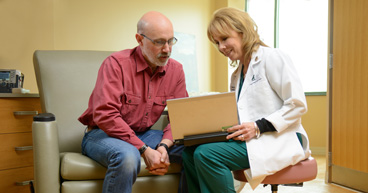
Over the past two decades, the United States has seen a steady decline in the number of people age 50 and older who have been diagnosed with colorectal cancer—a trend experts largely credit to more widespread awareness and screening. At the same time, the U.S. Centers for Disease Control and Prevention (CDC) reports a “statistically significant” increase in younger adults diagnosed with the disease.
This phenomenon spurred the U.S. Preventative Services Taskforce (USPSTF) in 2020 to recommend lowering the age to begin colorectal cancer screenings from 50 to 45. In doing so, the USPSTF, an independent body of medical experts tasked with making evidence-based recommendations about preventative clinical services, joined the American Cancer Society (ACS), which since 2018 has recommended starting screenings at age 45.
Colorectal cancer is the third leading cause of cancer-related deaths in the United States and the third most common cancer diagnosed in both men and in women, according to the CDC. The ACS estimates that in 2021, nearly 150,000 people will be diagnosed with colorectal cancer, and nearly 53,000 will die from the disease. In 2020, an estimated 18,000, of the diagnosed cases colorectal cancer and 3,640 deaths were in people younger than 50.
The ability to screen for the colorectal cancer has been transformative. Before 1969, many of those diagnosed with colorectal cancer faced a grim future with poor outcomes. That year, two New York surgeons performed the first colonoscopy using a flexible endoscope that could examine the entire colon and rectum, which total some 5 feet. A few months later, the same surgeons removed polyps during the procedure, called a polypectomy.
Since then, screening advancements have made it possible to detect precancerous polyps or cells, diagnose the disease earlier and treat it with better outcomes. This is because, in most instances, it takes years for a polyp to develop into invasive cancer. With regular colonoscopies, precancerous growths may be removed before ever growing or spreading. The chances of a positive outcome are much greater with early-stage cancer than they are with advanced-stage disease.
Late last year, the USPSTF announced that it had changed its recommended screening age based on “new science about colorectal cancer in younger people.”
“Screening earlier will help prevent more people from dying from colorectal cancer,” task force member Michael Barry, MD said in a news release. With an estimated 12 percent of 2020 colorectal cancer cases diagnosed in people younger than 50, this was welcome news, says Pankaj Vashi, MD, Department Head of Gastroenterology/Nutrition and Vice Chief of Staff at Cancer Treatment Centers of America® (CTCA), Chicago.
“Reducing the age by five years will make a difference,” he says. “And in another decade or so, they will have to reevaluate and see if it needs to be even younger. There are increasingly noninvasive ways of identifying early colon cancer, such as with the Cologuard® test, for asymptomatic people with no risk factors except for age. It’s a very sensitive test, but if a person is high-risk, colonoscopy is still the gold standard.”
Cologuard is a stool-DNA screening test approved by the U.S. Food and Drug Administration in 2014 for people at average risk for colorectal cancer—meaning they have no family history, inherited mutations or other known risk factors. People with any of those risks, as well as those who are obese and/or have diabetes, are heavy smokers or drinkers, or who are African American are also at increased risk—the latter risk factor attributed to a combination of less screening and lower stage-specific survival rates.
The rise in colorectal cancer in younger adults is being studied, but experts believe there’s a strong correlation between people following a more sedentary lifestyle and having poor eating habits, according to an ACS report on what causes colon cancer.
Dr. Vashi agrees. “People who are now in their 40s and 50s have grown up with different diets than the older population,” he says. “All the fast food and kids being sedentary due to the use of electronics [such as video games and phones] have caused more obesity today than ever before, and that’s a risk factor for colon cancer by itself.”
If you or a close relative has a history of colorectal polyps or colorectal cancer, your doctor may advise screening earlier than 45. Ditto for those with Crohn’s disease or ulcerative colitis —inflammatory bowel diseases (IBD) characterized by chronic inflammation of the gastrointestinal tract — or an inherited condition such as hereditary nonpolyposis colorectal cancer (HNPCC), commonly known as Lynch syndrome. The USPSTF advises medical providers to discuss with patients the pros and cons of the recommended screening options to help determine which is best for each individual. The most important takeaway: Get screened.
“Colorectal cancer is one of only a few cancers that can be diagnosed in a precancerous state,” says Dr. Vashi. “This disease can be significantly prevented.”



